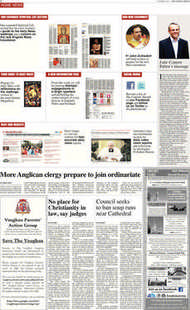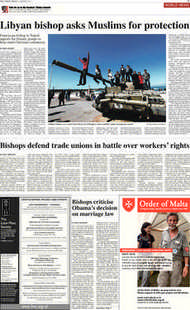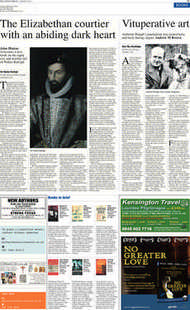Page 20, 4th March 2011
Page 20

Report an error
Noticed an error on this page?If you've noticed an error in this article please click here to report it.
Tags
Share
Related articles
Rebels Without A Cause
Death Comes To Us All, Even To Kings It Comes
Getting To Grips With Some Historical Realities
He Left Us More Than A Memory
Singing Alleluia
The king who ‘did God’
Stuart Reid Charterhouse
In all the excitement about The King’s Speech little attention has been paid to the speech itself. But what George VI said on the evening of September 3 1939, the day war was declared, was much more important than the way he said it. For it was a beautiful speech, a noble speech, and it tell us much about the way we were then and the way we are now. “For the second time in the lives of most of us we are at war,” said the King in his broadcast. “Over and over again we have tried to find a peaceful way out of the differences between ourselves and those who are now our enemies. But it has been in vain. We have been forced into a conflict...” And he concluded: “[W]e can only do the right as we see the right, and reverently commit our cause to God. If one and all we keep resolutely faithful to it, ready for whatever service or sacrifice it may demand, then, with God’s help, we shall prevail. May He bless us and keep us all.”
Neville Chamberlain’s words earlier in the day were equally noble. In The King’s Speech we hear the beginning of the Prime Minister’s broadcast: “This morning the British ambassador in Berlin handed the German government a final note stating that, unless we heard from them by 11 o’clock that they were prepared at once to withdraw their troops from Poland, a state of war would exist between us. I have to tell you now that no such undertaking has been received, and that consequently this country is at war with Germany.
“You can imagine what a bitter blow it is to me that all my long struggle to win peace has failed,” he continued. “Yet I cannot believe that there is anything more or anything different that I could have done and that would have been more successful.” Like the King, he invoked God. “Now may God bless you all. May He defend the right. For it is evil things that we shall be fighting against – brute force, bad faith, injustice, oppression and persecution – and against them I am certain that right will prevail.” That sort of talk would not be tolerated today. It is true that the Queen (whom God bless and preserve) will add a Christian touch to her Christmas broadcasts, but otherwise God is left out of the national equation. When Tony Blair took us to war with Iraq, he did not do God but instead appealed to the bourgeois morality of pious newspaper readers. It was as banal as it was fraudulent, but it was perfectly suited to our times. Nor can one imagine David Cameron providing greater inspiration. As the geopolitical dangers grow, he talks the talk of the Murdoch press: the behaviour of Gaddafi or Mubarak or whoever is “totally unacceptable”. Listening to the Prime Minister, you’d never guess that the Battle of Waterloo was won on the playing fields of Eton. But there you are. There
is nothing that can be done. Perhaps we no longer have words for these occasions because this generation could not fight a real war (and perhaps it is as well). At least The King’s Speech reminded us that we were once capable of better things, even if its primary purpose is to make us cry at the sight of a nice family man struggling to overcome a speech impediment.
There is one big but unavoidable historical irony in the film. When the King has given his speech he walks on to the balcony of Buckingham Palace with the Queen and the two princesses to acknowledge the cheers of his people. As I surreptitiously wiped the tears from my eyes, I reflected that a year earlier King George VI had walked on to the same balcony, this time, ironically, with Neville Chamberlain, who had just returned from Munich, where he had agreed to let Hitler annex the ethnically German Sudetenland. Chamberlain was a hero. There was to be peace in our time, and the monarch and his people, recalling the horrors of the First World War, were profoundly grateful. Who can blame them? Christopher Hitchens can, it seems. At any rate in an attack on The King’s Speech in Slate earlier this year, he made much of Chamberlain’s balcony scene, not to smile at history’s little ironies but to denounce George VI for his “unconstitutional” behaviour and the film for whitewashing the House
of Windsor: “Almost the entire moral capital of this rather odd little German dynasty is invested in the post-fabricated myth of its participation in ‘Britain's finest hour’. In fact, had it been up to them, the finest hour would never have taken place.” Is Hitchens perhaps a fundamentalist republican? Or a conspiracy theorist? Like most of his subjects, the King wanted to avoid war, but that’s not at all the same as saying that he was such an odd little German that he would have favoured capitulation in 1940.
In the past nine months Christopher Hitchens (whom God bless and preserve) has been an example to us all with his moral and physical courage in the face of cancer; but he is mostly wrong about The King’s Speech. It simply isn’t “a major desecration of the historical record”. His attack is, of course, entertaining and occasionally well-directed – Timothy Spall’s portrayal of Churchill is indeed “a woefully thin pastiche” and false, too, in that it shows him as a champion of the future George VI during the abdication crisis – but in the end Hitchens’s purpose is to defend the post-war liberal consensus that Munich was an unpardonable sellout: it’s the sort of thing you might expect to hear from Sarah Palin.
Remember the narrative? Saddam Hussein was the new Hitler. The lesson of history was clear: we could not afford to appease the Iraqi dictator. Well, we did not appease him. We went to war with him, and the world is now a nastier and more dangerous place than it was before the war.
Let me finish on a serious note: did The King’s Speech deserve its Oscars? Nah. It made me blub but it was a superior made-for-television flick. But it’s none of my business. These judgments are best left in the very capable hands of Andrew M Brown and Will Heaven.
blog comments powered by Disqus





















